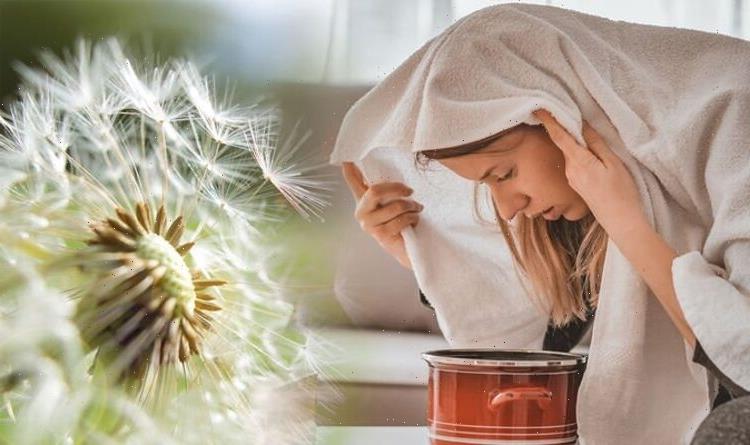Experts at LloydsPharmacy put bluntly: “There’s no cure for hay fever.” Aside from antihistamines being a staple in the cupboard of sufferers, there are other remedies to consider. For those really struggling with symptoms of hay fever, another option is Ectoin – a “naturally-derived” solution that “creates a coating of water molecules, protecting the skin from irritation and inflammation”. To help soothe a sniffly nose, itchy eyes and a sore throat, the combination of honey and lemon can not be dismissed.

We use your sign-up to provide content in ways you’ve consented to and to improve our understanding of you. This may include adverts from us and 3rd parties based on our understanding. You can unsubscribe at any time. More info
The pharmacy pointed out that a hot brew of honey and water is one “natural” home remedy that could ease troublesome symptoms.
In order to help alleviate a blocked nose, steam inhalation could be beneficial – or a hot shower.
How to do steam inhalation
- Fill a bowl with hot water
- Put a towel over your head and the bowl
- Inhale the steam.
Placing a cold compress on itchy and sore eyes could also help to alleviate irritating symptoms of hay fever.

The pharmacy added: “It’s also a good idea to check the pollen count at the start of the day.
“If it’s really high, and you get severe symptoms, it might be a good idea to stay home and keep your windows and doors closed.”
The condition affects up to one in five people during their lifetime, the NHS pointed out.
“You’ll experience hay fever symptoms if you have an allergic reaction to pollen,” the health body elaborated.
Specifically, it’s the protein released by plants that causes the sinuses, which are small air-filled cavities behind your cheekbones and forehead, to become swollen, irritated, and inflamed.
If you are experiencing symptoms of hay fever already, you likely suffer from an allergy to tree pollen, which is released during spring.
Symptoms ongoing, or triggered, at the beginning of summer (June) is likely caused by an allergic reaction to grass pollen.
In late autumn, hay fever symptoms could be representative of a weed pollen allergy.
If antihistamines and natural remedies only partially reduce the symptoms of hay fever, stronger treatment solutions might be needed.
For instance, there is the use of corticosteroid nasal spray and drops, which can also be prescribed by a doctor.
Immunotherapy may also be recommended, which needs to be carried out in specialised medical centres.
“Hay fever can lead to complications such as sinusitis and middle ear infections (otitis media),” the NHS cautioned.

Sinusitis can cause pain and tenderness in the face, throbbing pain when moving your head, toothache, or jaw pain when eating.
As for a middle ear infection, this occurs when the Eustachian tube (the thin tube that runs from the middle ear to the back of the nose) becomes blocked by a build-up of mucus.
A middle ear infection usually clears up within three days without medical intervention.
If, however, the infection keeps occurring, then you are best seeking advice from your doctor.
Source: Read Full Article






